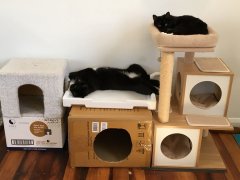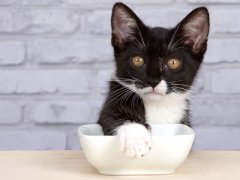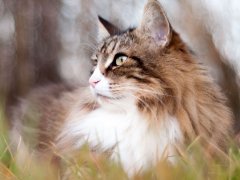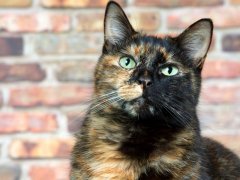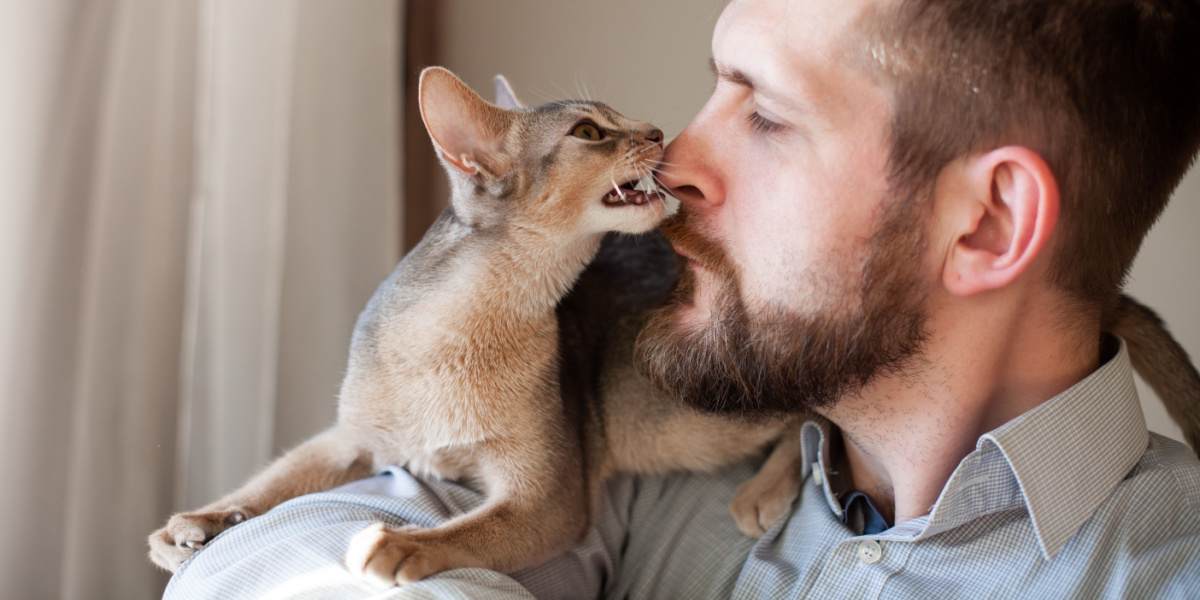
If your cat has an interest in your beard, you’ll be happy to know this is completely normal feline behavior. Showing attention to your hair, particularly facial hair, is probably not what you expected when you brought your new family member home, but cats are full of surprises.
Showing an interest in men's beards is a normal cat behavior and not a sign of ill health. Licking beards can be related to natural grooming behavior and can be a sign of affection. There are some health considerations when letting a cat lick or groom your beard including the risk of transmissible diseases.Key Takeaways
So why are cats interested in exploring our facial hair? There are actually a few interesting reasons that cats are interested in beards, facial fuzz, or cat owner’s hair. Read on to find out the top six reasons cats are interested in beards.
1. Beards Feel Like Fur to Cats
Cats have grown up grooming their fur, often the fur of other cats if they live in multicat households. Humans overall are not that hairy, so it’s natural for cats to reach to the parts of the body most resembling what they think of as normal to display affection in the form of grooming.
The coarse, textured feel of beard hair can be nibbled, sniffed, and licked with their tongue. Cats tend to start with sniffing and work up to licking so watch for the early warning signs if you are not wanting a bath from your cat!
2. Beards Taste Interesting
Because a man’s facial hair surrounds his mouth, it’s common for particles to get transferred to the beard during eating and drinking. You might not notice these tiny particles trapped in the hairs of the beard, but your cat will.
A cat’s sense of smell is their most important sense, and they will love investigating your beard to find out what you have had to eat today, and maybe find a crumb or two for themselves in the process! Cats will lick or even nibble at a man’s beard if they are allowed the opportunity.
If you use beard products, they can give off a smell that can be interesting for cats to taste. Always look at the labels of your products to make sure they are cat safe. For example, alcohol can be poisonous to cats even in small doses.
3. You Are Being ‘Marked’
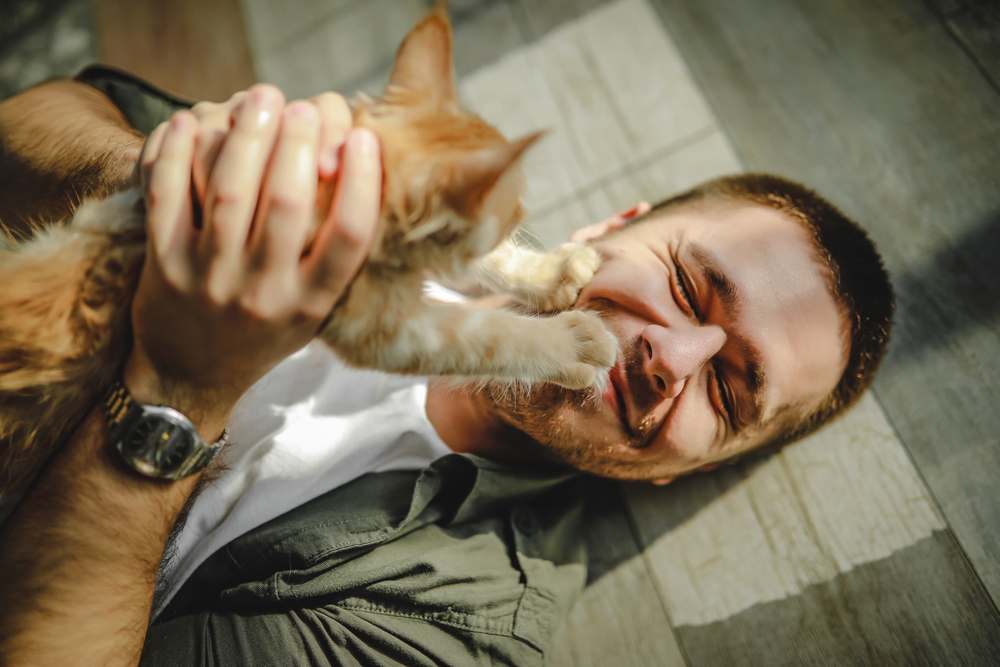
Beards are great places for your cat to rub their face and deposit pheromones that mark you as “theirs.”
This behavior can happen to bearded men or other members of the household. Your cat will rub their face or bop their nose on you to transfer pheromones onto your body. Pheromones are scent markers that help your cat to recognize you as part of their family and safe space.
Smelling the pheromones again, later on, creates a relaxing environment for your cat to be in. Your cat needs to regularly top up these marking pheromones so this behavior is repeated often, and it is comforting for your cat if you allow it.
4. Stress or Anxiety
Nuzzling or rubbing up against a beard can be a display of anxiety or stress. Cats can find comfort in physical contact or a soft nuzzle of a beard and it releases natural endorphins that soothe your cat. Cats love to feel safe, so if you’re noticing this behavior often, you might benefit from using anti-anxiety products or pheromones like Feliway to help your cat relax.
Some cats can find beards alarming, as they cannot see your facial expressions or features behind beards, particularly long beards, so attention can sometimes turn into aggression. If this happens with your cat, talk to a veterinarian for advice on how to help your cat adjust to your beard.
5. Attention Seeking
Your cat could just be saying hello! Giving attention to the beard and face is a sure way to make sure your affections do not go unnoticed. Cats communicate through body language and a cat that enters your physical space is often wanting to engage in playful behavior. Swap your beard out for toys instead, and enjoy some quality time with your cat.
Scientific Support
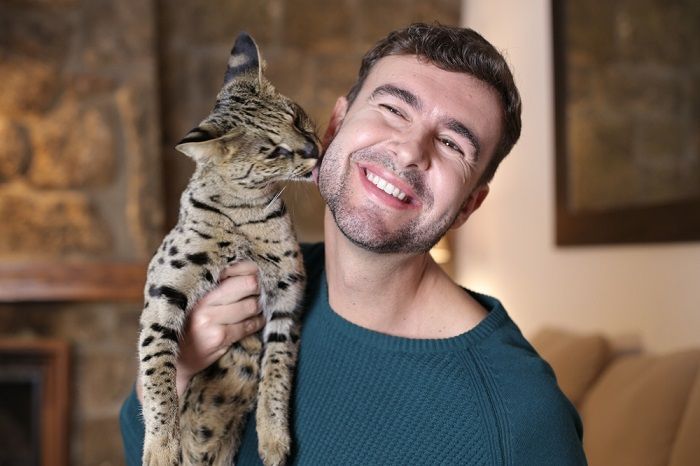
One study showed that cats noticed men’s beards, and seem to dislike very long beards.
A group of scientists published an article detailing their research on cat behaviors when shown photographs of men’s beards. Photographs of men with long beards, short beards, and dark beards were shown to each cat.
Then the reactions to the photos of men were noted. An interesting discovery in their research was that long beards attracted the most negative reactions from cats in the study. The study is small, however, so there is further room for more research to look into this topic.
I Want My Cat To Stop Licking My Beard, Mustache, and Hair
This can be a little tricky but can be achieved. The main goal is to redirect the grooming behavior into other activities, so you could choose to cuddle them instead, play with a toy, or try training a new skill. Cats are intelligent and will get used to the swap of activities easily.
Showing interest, grooming, or licking a man’s beard, regardless of length, hair type or texture usually does not pose a risk to their owners.
That being said, there are a few transmissible diseases such as ringworm, where you should avoid allowing your cat to touch or eat your beard. Ringworm is a fairly common skin lesion in young kittens or older cats, and shows as a circular area of hair loss with crusting. A veterinarian will be able to confirm the diagnosis. Ringworm is very contagious and even brief contact can be enough for an infection to transfer from your cat to your skin.
If you have any cuts, scabs, or wounds on the facial hair region, your cat can transfer bacteria or yeasts into wounds that can lead to infections.
Cat fur can carry parasites such as fleas, ticks, and lice. The risk of transmitting parasites is very low, although it is possible to get flea bites if your cat is heavily infested. Always use flea treatments regularly to keep fleas, ticks, and lice at bay. If you are unsure what products are best, have a look at this article.
Whatever beard styles are trending, some cats are naturally drawn toward a man’s beard, and it’s fascinating to find this theory so often known by cat owners anecdotally to be found to be true when scientifically researched.
This harmless behavior is often a way of showing affection and interest in you as a person, so we like to think of it as a compliment! Rarely this attention can turn into aggression, so talk to a veterinarian if you are having any difficulty with beard-related aggression in your cat.
Also Read: Petting Aggression In Cats: What It Is & How To Stop It
Frequently Asked Questions
Why does my cat lick my beard?
Licking men’s beards can be related to natural grooming behavior and can be a sign of affection.
Will my cat recognize me if I shave off my beard?
At first it might be a bit of a shock, but your cat will still recognize you from many other senses such as your natural smell and the sound of your voice. They might stay away from you for a few days while they adjust, or they might be very curious and want to look closely at your new look.
Should I let my cat groom our dog?
Cats might wish to groom or lick your dog's coat, and while this could be seen as a cute behavior, some dogs do not like cats in their personal space and can react negatively to such close interaction, mistaking affection for aggression. A dog has a powerful jaw and bites can cause real damage to cats, so try to redirect this behavior if possible.
-
https://www.neatorama.com/2011/01/04/feline-reactions-to-bearded-men/
-
https://cats.com/cat-intelligence
-
https://cats.com/do-cats-have-a-good-sense-of-smell
-
https://cats.com/best-flea-treatment-for-cats

